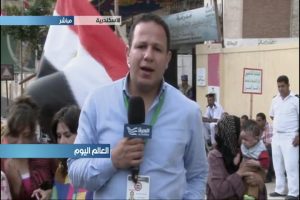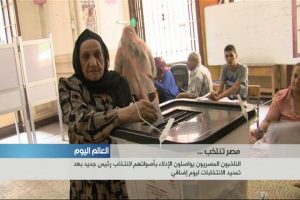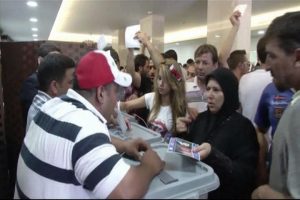Alhurra and Radio Sawa Bring the Egyptian Election to Audiences Across the Middle East

 As Egyptians went to the polls on May 26-28 for the presidential election, the Middle East Broadcasting Networks’ Alhurra Television and Radio Sawa provided extensive, multi-platform coverage leading up to, during and after the voting.
As Egyptians went to the polls on May 26-28 for the presidential election, the Middle East Broadcasting Networks’ Alhurra Television and Radio Sawa provided extensive, multi-platform coverage leading up to, during and after the voting.
With reporters based in 10 cities throughout the country, Alhurra Television spoke with voters, including one mother who brought her children to the polls so they could see democracy in action. Reporters interviewed voters about the issues influencing their decision including security, the economy, rights of minorities, power outages, fuel shortages and unemployment. The network also showed each of the candidate’s positions on these key issues. In addition, Alhurra reported on the role of international observers and explored the role of political satire and the arts on voters’ opinions of the candidates. The network’s reporting also included interviews with bloggers from throughout the country, including those that called for a boycott of the election.
 Alhurra’s daily political talk show Free Hour was extended to two hours during the first two days of voting and included experts such as David Schenker, Washington Institute of Near East Policy; Mohamed Mansour Ibrahim, member of the Presidential Council for the Nour Party; Mustafa Al Labbad, President of the Center for Political and Strategic Studies; Jim Walsh, Research Associate at MIT’s Security Studies Program and Hassan Nafea, Political Science Professor at Cairo University.
Alhurra’s daily political talk show Free Hour was extended to two hours during the first two days of voting and included experts such as David Schenker, Washington Institute of Near East Policy; Mohamed Mansour Ibrahim, member of the Presidential Council for the Nour Party; Mustafa Al Labbad, President of the Center for Political and Strategic Studies; Jim Walsh, Research Associate at MIT’s Security Studies Program and Hassan Nafea, Political Science Professor at Cairo University.
Al Youm looked at how al-Sisi’s campaign was counting on high voter turnout to show that the removal of former Egyptian President Morsi was the will of the people. Al Youm interviewed analysts from the U.S., Russia, European Union and Saudi Arabia to see how each of these countries viewed the election and examined how Israel closely followed the election and discussed the future relations between Israel and Egypt. The program also examined the other factions and political parties that did not have a candidate in the election and what the future held for them.
Leading up to the election, Alhurra’s Eye on Democracy and Hiwar Cairo also dedicated episodes to the election with Egyptian experts and analysts.
Radio Sawa expanded its key newscasts throughout the three days of voting on its Egyptian and pan-Arab streams. The radio network had correspondents in Cairo, Alexandria, Tanta, Aswan, Giza, Ismailia, Kafre-e-sheikh, who interviewed Egyptians as they came out to the polls. Radio Sawa also examined the role of women in the elections and what the campaigns were doing to garner the female vote. Radio Sawa looked at how the Muslim Brotherhood has been impacted by the upcoming elections; as well as how anti-Sisi voters have been using social media to campaign for Sabahi. Radio Sawa highlighted the role of international organizations in supervising and monitoring the election.
Radio Sawa’s coverage included interviews with the Al Waten party vice president, Secretary General of the Egyptian High Election Committee, the head of the International Mission to monitor elections, as well as representatives of the Sisi and Sabahi campaigns.
Radio Sawa’s daily talk show Sawa Magazine examined the pillars of each of the candidates foreign policy plans; and provided a round-up of comments from the first day of voting.
 Online, MBN live blogged about voter turnout in various locations throughout Egypt and examined the role of social media had leading up to the election. For example, one report discussed #Ask_Sisi, a Twitter hashtag launched by Al-Sisi’s campaign to field questions about his candidacy. Alhurra’s Facebook poll, which asked, “Who are you voting for in the Egyptian elections?” had more than 6000 Facebook ‘likes’ and more than 600 comments. Other reports online included a discussion on Israel’s reaction to a Sisi or Sabahi victory; a look at the U.S.’s expectations for the next president; a comparison of presidential candidate Sisi to former Presidents Mubarak and Nasser and their rise to power; and an examination of al-Sisi’s decision not to participate in televised debates with his challenger. RadioSawa.com’s SawaCam surveyed political opinions of Egyptian expatriates voting at the Egyptian Embassy in Washington, D.C. The video has received more than 3700 hits on YouTube thus far.
Online, MBN live blogged about voter turnout in various locations throughout Egypt and examined the role of social media had leading up to the election. For example, one report discussed #Ask_Sisi, a Twitter hashtag launched by Al-Sisi’s campaign to field questions about his candidacy. Alhurra’s Facebook poll, which asked, “Who are you voting for in the Egyptian elections?” had more than 6000 Facebook ‘likes’ and more than 600 comments. Other reports online included a discussion on Israel’s reaction to a Sisi or Sabahi victory; a look at the U.S.’s expectations for the next president; a comparison of presidential candidate Sisi to former Presidents Mubarak and Nasser and their rise to power; and an examination of al-Sisi’s decision not to participate in televised debates with his challenger. RadioSawa.com’s SawaCam surveyed political opinions of Egyptian expatriates voting at the Egyptian Embassy in Washington, D.C. The video has received more than 3700 hits on YouTube thus far.
